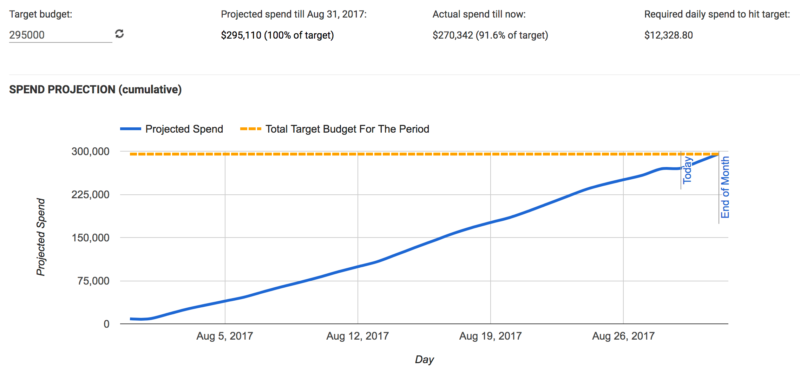
It’s the end of the month, so chances are you’re spending a lot of time thinking about PPC budgets. Will you spend the full amount you allocated for the month and do so without going over budget?
It’s pretty amazing that simple questions like this have to take so much thought from account managers. There’s gotta be an automation for this, right? Once again, AdWords Scripts to the rescue!
So read on, and I’ll point you to some useful ones that have been around awhile and share a brand-new script for allocating budgets equitably among multiple locations in hard-to-target cities.
Translating PPC budgets to business budgets
Part of the reason budgets are such a pain is that the engines think about them differently from the average company. A company sets monthly, quarterly or annual budgets. AdWords, on the other hand, relies on daily budgets.

Companies tend to think about budgets pretty broadly; for example, they might have a marketing budget with a subset of that allocated for AdWords. But AdWords works primarily with campaign budgets. Facebook gets even more granular with Ad Set budgets.
Because of the way advertisers have to set up budgets in the engines, even a simple business requirement like spending $10,000 on AdWords this month can get pretty tricky.
Solution #1: Spend your whole budget for the month
Let’s tackle the first common budget problem: how to make sure that every campaign or shared budget spends the full amount, even when there are a few days in which traffic may have been unexpectedly weak.
Google automatically handles this to some degree with overdelivery. But overdelivery is limited to 20 percent of the budget per day, so it won’t always be able to make up the difference.
It’s also a challenge for advertisers because they will often set a daily budget they think will help them achieve a goal, but they’ll have a monthly budget amount in the back of their mind. There’s no way to communicate the true budget goal to Google. Google simply assumes that the real goal is to spend 30.4 times the daily budget in any month.
Luckily, Google has written a great AdWords script to help reach budgets, wherein you set a monthly target, and the script updates the daily budget based on how much is left to be spent and how many days are left.
At Optmyzr, we made this script available in our patent-pending Enhanced Scripts library, and we even gave it the ability to use historical day-of-week patterns to allocate more budget to higher-potential days of the week — a feature that’s particularly useful in the last few days of the month, when Google may miss out on the fact that you typically spend relatively little on the weekend.

This preview from AdWords scripts shows how the script is able to detect historical day-of-week delivery patterns and use this to set an appropriate daily budget to ensure the full budget will be spent by the end of the month. Screen shot courtesy Google, August 2017.
While these tools help ensure you’re not underspending, we’re still left with the problem over overspending.
Solution #2: Don’t exceed your budgets
If you don’t make many changes in AdWords, you could use the daily budget to make sure you’re never spending too much for a campaign for the month. Remember, they will not bill you more than 30.4 times the daily budget amount for any month; they call this the monthly charging limit.
But advertisers reading posts on Search Engine Land are probably not content to use a set-it-and-forget-it approach. The moment you shift budgets between campaigns in an attempt to optimize, or the moment you use a script like the one above, the calculation of the monthly charging limit no longer matches your true monthly budget goal.
Furthermore, a well-managed account uses as much granularity as possible because it provides more control. So advanced advertisers likely use campaign-level budgets rather than one shared budget for the whole account. This means that the company goal of a certain monthly AdWords budget still has to be translated into separate campaign budgets.
Now, you could use Automated Rules to turn off campaigns when they spend too much, but these rules can only run once per day, so your ads could continue to accrue additional cost for 23 hours and 59 minutes after they hit their limit.

Account managers usually want to stay within a total monthly budget across their entire AdWords account, so they may build spreadsheets or tools to track how they are doing against their targets. Screen shot courtesy of Optmyzr, August 2017.
To address this, we created a free script that can pause all campaigns in an account when the monthly target budget for the account is reached. It’ll even re-enable all the campaigns it paused when the next month starts. When I created this script, I thought it’d also be useful to give advertisers the ability to set budgets at a lower level than the campaign. So I added budgets for ad groups, keywords and ads.
The use case this solves is when advertisers add new keywords to experimental campaigns because they fear these new keywords could take away too much budget from keywords that have been in the account awhile and whose performance is already well understood.
When these keywords eventually prove themselves, they have to be moved into the non-experimental campaign, and they lose history. With this script, an advertiser can simply add a new keyword or ad into the place it should eventually be and use a script to limit its budget until it has proven itself.
Solution #3: Maximize traffic and split budgets fairly for franchises
But could we use a script like the one mentioned above to enforce budgets at another level, like by location? At first that may seem like a bit of a stupid suggestion, because after all, campaigns have location targeting and a campaign budget, so aren’t budgets in AdWords today effectively location budgets? While that’s true, there is a scenario in which I believe this can still be useful.

Say you’re running ads for a franchise. Typically, you’ll set up separate campaigns for each location, each with its own budget. But in densely populated areas, you might have multiple franchises in the same city.
For example, in Mountain View alone, there are eight Subway sandwich shops. If each of those locations needs to get their fair share of PPC advertising dollars, you could use separate campaigns with ZIP code targeting.
But the problem is that as you get more granular with targeting, Google is not always able to know where a user is, and you end up losing traffic. In one of my own campaigns, I looked at postal code data for our ads when they show in Australia. There were 18 clicks with a postal code associated. But in that same day, there were 30 clicks from Australia.
So Google didn’t know enough about the location for these 12 clicks to associate them with a postal code. These 12 clicks would have been lost if I were targeting only postal codes, rather than broader entities like cities or regions. So, to get more volume and to reduce the number of campaigns you need to maintain, it’s often desirable to target broader locations, like cities or regions.
But as a franchise, if I run a campaign for all of Mountain View, it’s possible that one of the locations eats up 70 percent of the budget, leaving just a small amount for the remaining six locations. While it may make sense from a business perspective to spend more where there are more people, in a franchise model, there is often a contract that says every location will get its fair share of the ad spend.
So here’s a script that looks at location data for a campaign and lets you disable specific granular locations when they exceed a certain level of spend for the month.
Conclusion
Budgets are not hard to understand, but they can be time-consuming and tedious to manage manually. Looking at whether daily budgets are dialed in to fully spend the target; ensuring an account hasn’t spent too much; and analyzing budget usage for granular locations are all well-defined tasks — all of this makes these tasks ideal for automation with AdWords scripts.
Contributing authors are invited to create content for Search Engine Land and are chosen for their expertise and contribution to the search community. Our contributors work under the oversight of the editorial staff and contributions are checked for quality and relevance to our readers. The opinions they express are their own.



